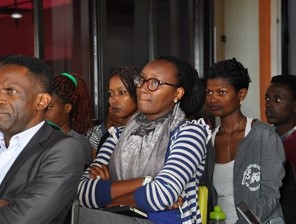|
Context Rwanda’s economy has experienced fast and sustained growth at an average of 8 per annum from 2000-2013. However, the high and sustained economic growth realized by Rwanda has, not been translated into sufficient productive employment particularly for the growing youth cohort aged 14-35 years, which represent 39.3 per cent of the country’s population. Consequently, driven by 2.8 per cent annual population growth rate over the period 2010–2013, Rwanda’s working-age population has continued to increase and outpace the country’s rate of job creation. In this respect, an estimated 125,000 first-time job seekers enter the country’s labour market each year but which the country’s economy cannot be able to absorb. Indeed, with a total of 396,000 waged jobs in the formal economy, only a handful of new labour market entrants are able to gain access in the formal sector. While only 4 per cent of active youth are unemployed, 65 per cent are underemployed. The youth are disproportionately located in—and migrating to—urban areas where youth unemployment is three times that of rural areas.
Implementation of programme/initiative The kLab was founded by Rwanda Development Board (RDB), Japan International Cooperation Agency (JICA) and ICT Chamber of the private sector in 2012. Different donors ranging from development partners like JICA and GIZ, and international companies fund it. The kLab also generates income through partnerships to implement projects and/or initiatives. Knowledge Lab (kLab) is a unique open technology hub in Rwanda where students, fresh graduates, entrepreneurs and innovators come to work on their ideas/projects to turn them into viable business models. It is an open venture that offers free space, free mentorship and free internet to the youth. It is a public private partnership that aims to create jobs by innovating, nurturing, establishing and empowering companies. It targets young people who are under 35 years of age, and operates on a 24 hour-7days a week basis. The kLab also acts as a nursery for the public and private sector by training manpower and serves as a learning environment for young people through empowerment of the private sector in translating ideas to viable businesses. The growing kLab community constitutes of experienced mentors who provide both technical and business assistance to needy members.
Main challenges kLab faces three main challenges, namely limited physical space, inadequate access to finance and low skill level of youth. The kLab has a small working space, which cannot adequately serve the beneficiary youths. It is working on a framework for partnership and collaboration with the local universities and secondary schools to address the challenge of space. To address the challenges of inadequate finance, the kLab started a TV program called “Face the gorillas”, through which five entrepreneurs are provided with live TV after every 3 months to pitch their business ideas to get investment. This started in 2014 and so far 25 per cent of those entrepreneurs have got investment funds ranging from US$ 25,000-US$ 1,000,000. In regard to skills deficiencies of the young people, the kLab addresses this by assigning them mentors, especially in areas of marketing and business plan preparation. The mentors also act as consultants. The kLab has a total of 300 are mentors for the estimated 1,600 beneficiaries, which gives a ratio of 1 mentor to every 6 young people.
Results achieved The kLab has more than 1,600 members and 51,600 people used the kLab premises in 2016 alone. About 200 companies have been born out of kLab, 60 of whom have reached the break-even point. Among the 60 companies, 4 are market leaders in their respective areas of operation. About 700 direct jobs have been created by the kLab companies.
Moving Forward kLab has plans to open spaces in each of the country’s districts from the four branches that it has currently. kLab also plans to venture into other parts of the African continent. The kLab also plans to raise funds of up to US$ 100 million to support entrepreneurs with strong viable business ideas.
Replicability The success behind the mission and the vision of kLab is the close partnership and collaboration between it and government, chamber of commerce, development partners, academia, universities and big corporations. The kLab also focuses on a specific sector, which is the ICT. Given that the ICT cuts across all sectors of the country’s economy and a key enabler to the country’s growth and development, this makes kLab intervention to be much more replicable. |
|
| References | www.centreforpublicimpact.org/driving-growth-rwandas-klab/ www.newtimes.co.rw/section/read//2090/,
http://www.un.org/youthenvoy/2016/01/youth-economic-opportunity-ecosystem-analysis-rwanda-via-uncdf/ |
Project Details
Date: November 20, 2017
